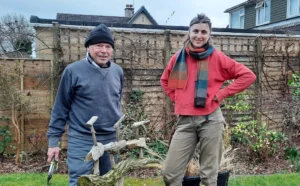Combat Loneliness with These Simple Effective Tips
Loneliness affects countless people every day, making it more than just a personal feeling; it’s a societal challenge. Whether you’re feeling isolated in a crowded city or cut off from loved ones in a rural community, the impact of loneliness on mental and physical health can’t be ignored. Fortunately, there are practical ways to combat loneliness and rediscover connections, many of which have been proven to make a powerful difference.
Our hapipod platform, a practical home sharing matching site platform connecting householders with like-minded lodgers, is one example of how innovative solutions can help tackle this issue.
Understanding Loneliness in the UK
The statistics around loneliness in the UK reveal the depth of this issue.
- According to the Office for National Statistics, 7% of adults in the UK often feel lonely, while 20% experience loneliness occasionally.
- Over half of those aged 75 and older live alone, putting them at high risk of chronic loneliness, according to Age UK.
- Those in rural areas often face loneliness due to geographic isolation, while individuals in urban environments may feel surrounded yet disconnected.
Loneliness has real health consequences, increasing the risk of depression, anxiety, and even physical illnesses like heart disease and stroke. Addressing it isn’t just about coping, it’s about creating meaningful change.
See also – Every Mind Matters NHS Better Health
How to Overcome Loneliness Without Friends
Not having a close circle of friends doesn’t mean you’re doomed to loneliness. Here’s how to start feeling more connected:
- Engage in activities to cope with loneliness: Interests like gardening, journaling, or taking a fitness class can provide both structure and joy. hapipod’s hosting or lodging opportunities, which pair people with like-minded individuals, can also provide built-in company.
- Join online communities for people with similar interests: Platforms dedicated to hobbies, interests, or mental health support, like Together Friends or Meetup, are excellent starting points.
- Find simple ways to feel connected: Small moments of interaction, like saying hello to neighbours or smiling at strangers, can brighten your day.
How to Combat Loneliness When You Are Single
Navigating loneliness as a single person can be empowering when approached with the right mindset.
- Volunteer opportunities to combat loneliness give you a chance to meet others while contributing to your community. hapipod’s concept of mutual aid, where lodgers provide householders with help and company, can bring a sense of shared purpose.
- Explore the best apps for combating loneliness: From Bumble BFF to Nextdoor, there are many digital tools to help you find friends or local connections.
- Focus on building meaningful relationships: Prioritise deeper connections over surface-level socialising; even one strong bond can dramatically improve how you feel.
How to Deal with Loneliness as a Young Person
Studies show that 10% of 16-24 year olds feel lonely often or always.
- Overcoming Social Media-Generated Anxiety: Isolation and comparison are the downsides of social media and can be challenged by engaging in social activities and building strong relationships. (Bournemouth University Study)
- Create Supportive Environments: Transitioning between life stages can be tough. Find welcoming, supportive spaces with relatable people to foster good connections.
- Consider hapipod for a mentor-friend housemate (if you’re 18+): Joining a household where you feel at home but independent, valued for who you are and where you can express your issues to someone older with experience can be very rewarding.
How to Deal with Loneliness When You Are a Woman
For women, societal pressures and unforeseen circumstances often amplify feelings of isolation.
- Dealing with loneliness naturally: Self-care practices, such as yoga or meditation, can help you process emotions and feel grounded.
- Reach out for loneliness and mental health support: Talking to empathetic professionals or joining women-focused groups can ease the burden.
- Explore home sharing options like hapipod: Living with someone supportive can offer companionship without the pressure of a romantic relationship.
How to Combat Loneliness When You Are a Man
Men often struggle with loneliness in silence due to societal expectations around masculinity.
- Overcoming loneliness strategies: Join goal-oriented groups, like sports leagues or DIY workshops, where socialising happens naturally.
- Reframe vulnerability as a strength: Opening up to trusted friends or therapists about how you feel strengthens, rather than weakens, relationships.
- Consider hapipod for a like-minded housemate: Sharing living spaces with compatible individuals can remove isolation in a low-pressure environment.
What Are the Traits of a Lonely Person?
Recognising loneliness is an important step toward addressing it:
- Self-isolation: Avoiding social gatherings or interactions.
- Negative self-perceptions: Believing you aren’t likeable or don’t deserve relationships.
- Symptoms of stress: Poor sleep, lack of energy, or increased anxiety.
- Social comparison: Feeling like everyone else is more connected or fulfilled.
By identifying these traits in yourself or others, you can work toward solutions.
How to Overcome Loneliness and Depression
When loneliness spirals into depression, it’s vital to seek support and take actionable steps.
- Seek professional help: Therapy, especially cognitive behavioural therapy (CBT), can help reframe negative thought patterns.
- Develop a routine: Consistency in your day-to-day life provides stability and a sense of purpose.
- Rediscover connection through shared living: hapipod brings people together not only to share living spaces but also to share common interests, skills, and meaningful experiences. A compatible lodger or host can provide the consistent social connection you need.
- Focus on small victories: Whether it’s getting out of bed, taking a walk, or cooking a nutritious meal, each step is progress.
The Loneliness of Ageing
For older adults, loneliness is particularly prevalent due to life-stage transitions like retirement or losing loved ones.
- Practical tips for loneliness include: Local befriending schemes, joining senior interests groups, or engaging in intergenerational programs to share wisdom and skills.
- hapipod is uniquely suited to address loneliness in ageing populations by pairing older householders with lodgers of the same age or younger who offer both practical help and good company.
Rural vs. Urban Loneliness
Loneliness manifests differently depending on where you live.
- Rural areas: Individuals often feel isolated by distance. hapipod can help connect those in remote locations with helpful lodgers, easing household burdens and creating a more interactive, sociable environment.
- Urban areas: While proximity to others is higher, “social crowds” can make meaningful relationships harder to form. Joining small, focused community groups or creating structured connections through platforms like hapipod can help.
How Do You Combat Loneliness?

Loneliness is a deeply human experience, but it doesn’t have to define your life. By tackling the root causes and implementing proven solutions, like practical tips for loneliness, exploring homesharing through hapipod and utilising online communities, you can rebuild connection and purpose.
Whether you’re navigating loneliness as a single person, a man, a woman, or dealing with depression, remember this: taking the first step, no matter how small, sets the foundation for meaningful change. You’re not alone, and there are tools, communities, and solutions out there to support you.
We would love to hear how you combat loneliness, what you have tried and what has worked for you.
Start today. Choose connection. Choose hapipod.com (sign up before midnight on 31st July 2025, for a FREE 6 month trial.)
See also – 8 Myths About Homeshare, Debunked
Share this content:













Post Comment